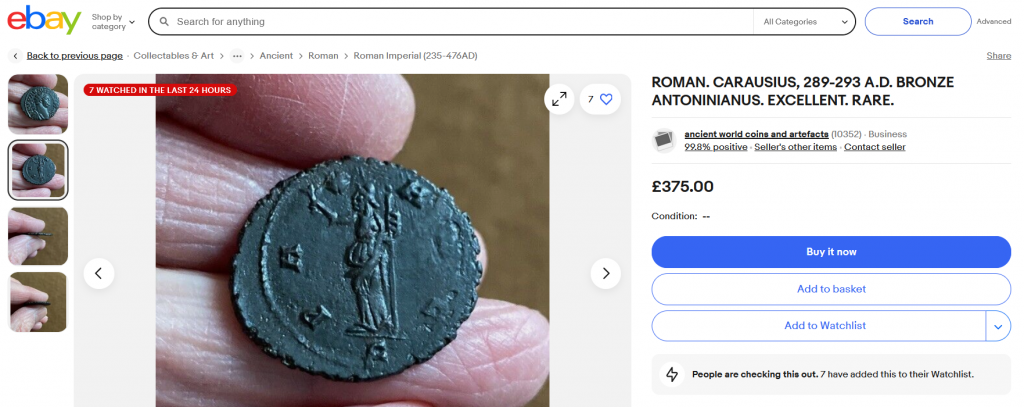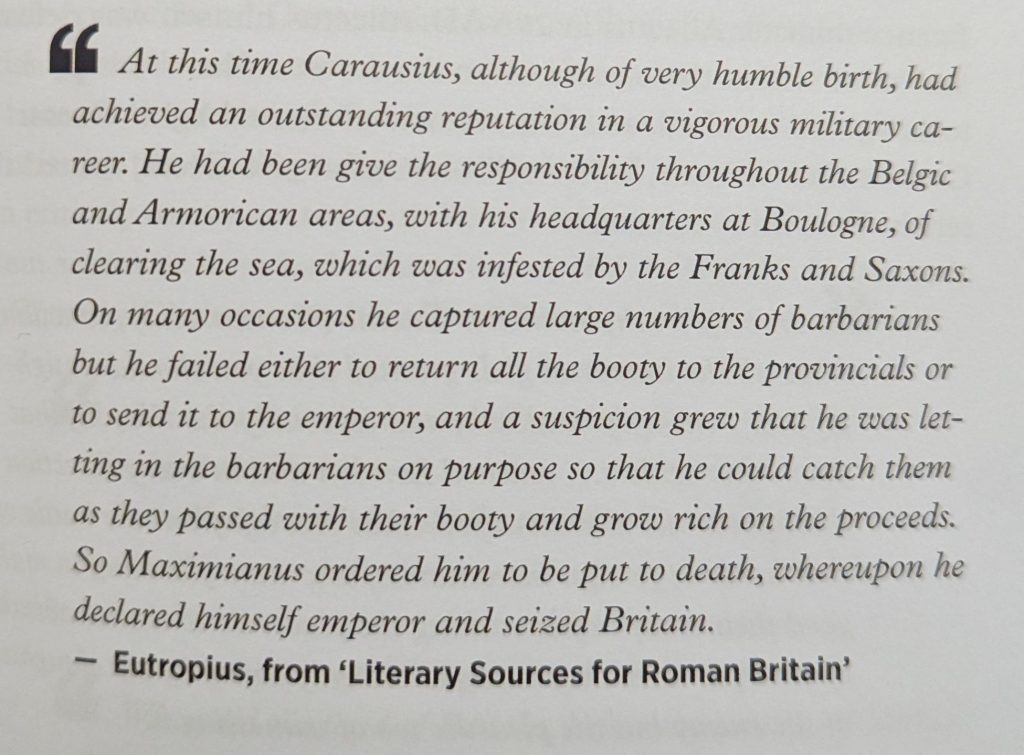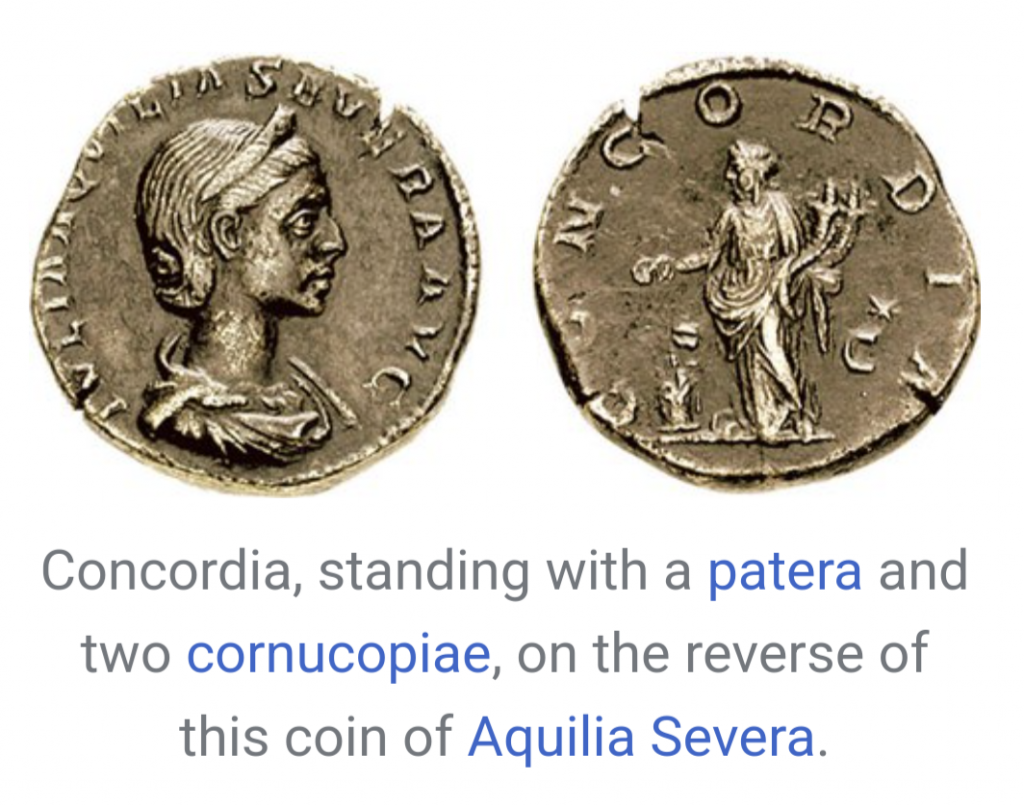
The Goddess Book of Days (Diane Stein) lists today as the birthday of Pax and her Greek equivalent Irene. She is the Goddess of Peace and the daughter of Jupiter and the Justitia, Goddess of Justice. This suggests that a lasting peace can only be assured by strength and justice. The usurping Emperor Carausius (whose coin you can see above) had good reason to use Pax on his coins. He took control of Britain and some of Gaul from the Roman Empire. But he seems hoped he might rule alongside the Tetrachy of Emperors set up by Diocletian.
This is what Eutropius wrote:

He was murdered by Allectus his financial minister in 296AD. Text above taken from my book In Their Own Words where you can read the rest of Carausius’ story.
Concordia
The Goddess book also says this is the day of the Concordia Peace Festival in Rome. Concordia is the Goddess of agreement, in war, marriage and in civic society. Harmonia is the Greek equivalent. Ovid has special days to Concordia on January 17th and January 30th. I’m led to the idea that much of January was dedicated to Concordia and Pax. For more on Concordia, look at my January 17th post here.
Pax in Ovid
Pax had her festival on the 30th January. Ovid in Fasti writes:
Book I: January 30
My song has led to the altar of Peace itself.
This day is the second from the month’s end.
Come, Peace, your graceful tresses wreathed
With laurel of Actium: stay gently in this world.
While we lack enemies, or cause for triumphs:
You’ll be a greater glory to our leaders than war.
May the soldier be armed to defend against arms,
And the trumpet blare only for processions.
May the world far and near fear the sons of Aeneas,
And let any land that feared Rome too little, love her.
Priests, add incense to the peaceful flames,
Let a shining sacrifice fall, brow wet with wine,
And ask the gods who favour pious prayer
That the house that brings peace, may so endure.
Now the first part of my labour is complete,
And as its month ends, so does this book.
Translated by A. S. Kline 2004 (Tony has a lovely site here: where he makes his translations freely available.)
Concordia, Julia Aquilia Severa & Elagabalus

The coin above is of Julia Aquilia Severa. She was a vestal virgin, who married the Emperor Elagabalus (c. 204 – 11/12 March 222). She was his 2nd and 4th wife. Normally, a vestal virgin was buried alive, if she lost her virginity.
But I probably should say ‘her 2nd and 4th wife’ as some sources suggest Elgabalus wanted to be known as a woman. The Wikipedia page of his wife has Elagabalus with the pronoun, ‘Her’. While the Emperor’s own web page uses him throughout. He or she married several women and was said by some to be married to several men. They were also accused of prostituting themself in Taverns and Brothels. Clear? Confusing pronouns? Sorry to hedge my bets, but we don’t know what Elagabalus would want us to use? Wikipedia says:
‘In November 2023, the North Hertfordshire Museum in Hitchin, United Kingdom, announced that Elagabalus would be considered as transgender and hence referred to with female pronouns in its exhibits due to claims that the emperor had said “call me not Lord, for I am a Lady”‘
Elagabalus was born Sextus Varius Avitus Bassianus. He adopted the name of Elagabalus as he was a supporter of Syrian Sun God Elagabal. He, a Syrian, wanted to promote the God to the top of the Roman Pantheon of Gods. Varius rose to power partly because of his strong Grandmother, Julia Maesa. She was the sister of Julia Domna, the wife of African Emperor Septimus Severus (who lived for some time in York). Their children are the Emperors depicted in Gladiator II starring Paul Mescal.
Elagabalus’s reign was fairly chaotic. He lost power, when his Grandmother transferred support to his cousin, Alexander, and Elagabalus and his mother were assassinated.
Here, is a fascinating article in the Guardian about the Pax Romana. ‘Their heads were nailed to trees.’
Pax & Tagging
Posh boys in England, playing tagging games, used to shout ‘Pax’ to claim immunity or to call a temporary halt in the contest. I remember my childhood friends using the word ‘vainites’ as well as pax. But we were not by any means posh. There are many other ‘truce’ terms used in tagging games. They are listed in this fascinating. Wikipedia page. From which I discover that Vainites comes from the medieval period and means: ‘to make excuses, hang back or back out of battle’.
First Published in January 2024, and revised, expanded and retitled in January 2025

![“To Concordia,¹ the Sixth Legion, Victorious, Loyal and Faithful and the Twentieth Legion [dedicates this].” found at Roman Corbridge (Coriosopitum)](https://www.chr.org.uk/anddidthosefeet/wp-content/uploads/2023/01/To-Concordia¹-the-Sixth-Legion-Victorious-Loyal-and-Faithful-and-the-Twentieth-Legion-dedicates-this..png)